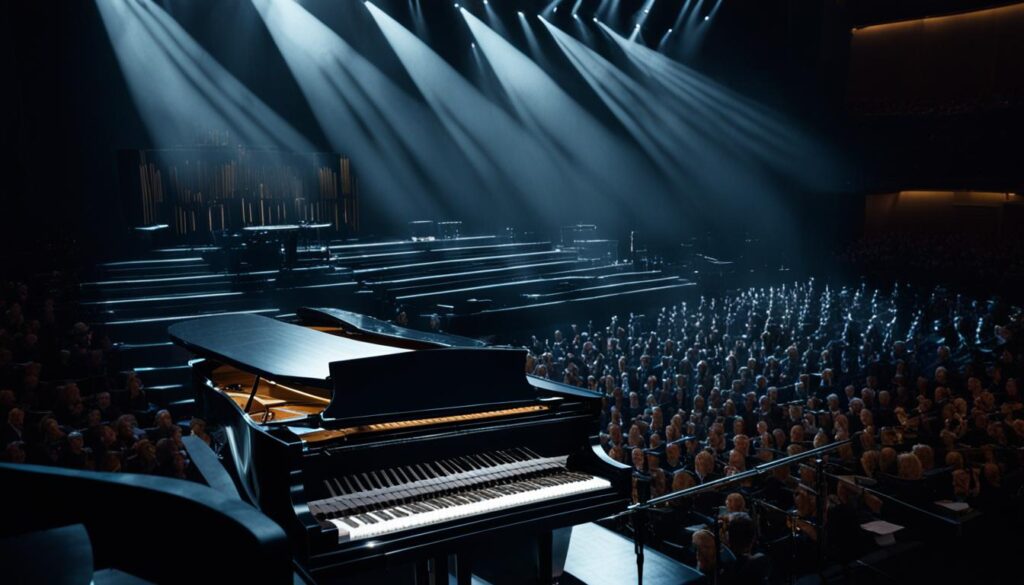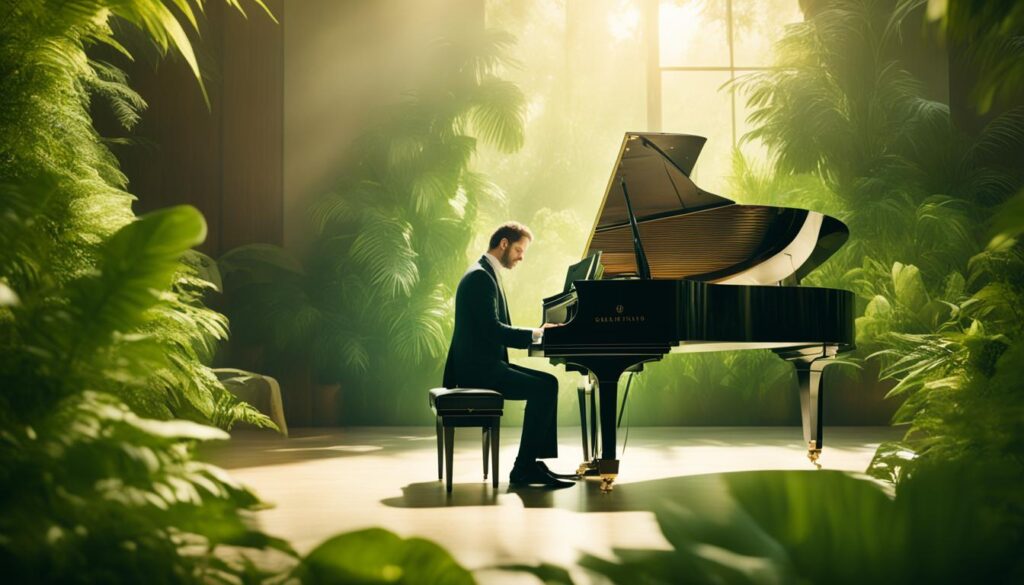By Alex Demetriou, Curator @ TheClassicals.com by Loungest
Classical music has always held a special place in society, and its importance in modern life cannot be overstated. Despite changing musical preferences, classical music continues to play a significant role in various aspects of well-being, creativity, and cultural heritage. Its impact reaches beyond entertainment, influencing our emotions, stimulating our minds, and inspiring creative expression.
Classical music has a timeless influence on modern society, representing our traditions and beliefs. It connects us to the natural workings of the world, evoking a sense of wonder and beauty. Despite shifts in popularity, classical music remains present in our everyday lives through movies, commercials, and public events. Its significance as an art form cannot be underestimated.
Listening to classical music offers numerous benefits, enhancing cognitive abilities, improving focus, reducing stress, and increasing productivity. It creates a calm and peaceful atmosphere, promoting relaxation and well-being. Moreover, appreciating classical music broadens our cultural horizons and fosters a deeper understanding and appreciation of the arts.
In the digital age, classical music has become more accessible than ever before. Online streaming platforms, digital downloads, and live broadcasts have expanded its reach. Public radio and the internet have provided opportunities for public education and innovative approaches to the concert experience. Classical music continues to evolve and adapt, reaching new audiences and redefining the way it is consumed.
Key Takeaways:
- Classical music holds a significant role in modern life, beyond entertainment.
- It evokes emotions, stimulates the mind, and inspires creative expression.
- Listening to classical music offers cognitive, emotional, and cultural benefits.
- The digital age has made classical music more accessible and innovative.
- Classical music continues to captivate audiences and enrich our lives.
The Enduring Influence of Classical Music
Classical music holds a timeless influence on modern society. It represents the traditions and beliefs that shape our culture and connects us with the natural workings of the world. Classical compositions evoke emotions, stimulate the mind, and inspire creative expression. Despite shifts in popularity and consumption patterns, classical music continues to be present in our everyday lives through various mediums such as movies, commercials, and public events. Its significance as an art form cannot be underestimated.
“Classical music is the soundtrack of our heritage, woven into the fabric of society. It influences our emotions, uplifts our spirits, and transports us to different eras. Its enduring legacy resonates with people of all ages, offering solace, inspiration, and a deeper understanding of our shared humanity.” – Sarah Johnson, music historian
From Beethoven’s powerful symphonies to Mozart’s delicate sonatas, classical music has a profound impact on individuals and communities alike. Its melodies have the power to create a sense of unity and cultural identity, transcending time and geographical boundaries.
- The impact of classical music can be felt in various aspects of society. For example, classical compositions are often used in film soundtracks to enhance the emotional impact of a scene. The timeless beauty of classical music conveys a depth of emotion that resonates with audiences, capturing the essence of the storyline.
- The influence of classical music extends beyond entertainment. It has inspired countless artists, from painters to poets, who incorporate classical themes into their work. This cross-pollination of artistic disciplines enriches our cultural landscape and demonstrates the enduring power of classical music to inspire creativity.
- The significance of classical music is evident in public events and celebrations. From grand symphony performances to intimate chamber concerts, classical music enriches our experiences and creates lasting memories. It fosters a sense of community and shared appreciation for the arts.
Moreover, classical music serves as a gateway to explore different periods in history and appreciate the achievements of composers from the past. It encourages introspection, critical thinking, and a deeper connection with our emotions.
The Universal Language of Classical Music
Classical music transcends language barriers and cultural differences. It has a universal appeal that speaks to the hearts of people around the world. Whether it’s a powerful symphony or a delicate piano piece, classical music has an innate ability to evoke profound emotions and ignite the imagination.
Furthermore, classical music has the power to soothe and heal. It has been used therapeutically to alleviate stress, reduce anxiety, and promote relaxation. The harmonies and rhythms of classical compositions create a serene and tranquil atmosphere, allowing listeners to find solace and rejuvenation in the midst of a hectic world.

In conclusion, classical music’s enduring influence is a testament to its timeless beauty and significance. It connects us to our cultural heritage, evokes powerful emotions, and inspires creativity. Classical music is not merely a relic of the past, but a living art form that continues to shape our lives and enrich our experiences. Its impact on modern society cannot be overstated.
The Benefits of Listening to Classical Music
Listening to classical music offers numerous benefits. Not only does it provide enjoyment and entertainment, but it also has a positive impact on our well-being and cognitive abilities.
Enhanced Cognitive Abilities
Research has shown that classical music can have a profound effect on our brain’s cognitive functions. Listening to classical compositions activates various areas of the brain associated with memory, attention, and problem-solving. This stimulation can lead to improved cognitive abilities, such as enhanced memory retention, increased creativity, and improved problem-solving skills. Classical music appreciation can be seen as a mental workout that exercises and challenges our brains, keeping them sharp and agile.
Improved Focus and Productivity
Classical music has a unique ability to create a calm and peaceful atmosphere, making it an ideal companion for focused work or study sessions. The soothing melodies and harmonies of classical compositions can help to drown out distractions and improve concentration. Studies have shown that listening to classical music while working or studying can lead to increased productivity, improved focus, and a higher quality of work. So, the next time you need to tackle a challenging task, consider turning on some classical music to enhance your focus and productivity.
Reduced Stress and Promotes Relaxation
In our fast-paced and stress-filled lives, finding moments of relaxation and tranquility is essential for our overall well-being. Classical music’s calming and soothing nature has been found to have a profound effect on reducing stress levels and promoting relaxation. The slow tempos, gentle rhythms, and melodic structures of classical compositions can induce a sense of calmness, helping us unwind and destress after a long day. So, whether you’re looking to unwind after a busy day or simply want to create a serene atmosphere, classical music can provide the perfect soundtrack for relaxation.
Broadens Cultural Horizons and Fosters Appreciation of the Arts
Classical music appreciation goes beyond the enjoyment of a beautiful melody. It can also broaden our cultural horizons and foster a deeper understanding and appreciation of the arts. Classical compositions carry with them a rich history and cultural significance that can open our minds to different eras, traditions, and artistic expressions. By exploring the works of renowned composers such as Mozart, Beethoven, and Bach, we can gain insights into the historical and cultural contexts in which these masterpieces were created. This exposure to classical music can cultivate a greater appreciation for the arts and enrich our cultural experiences.

| Benefits of Listening to Classical Music | Description |
|---|---|
| Enhanced Cognitive Abilities | Stimulates memory, attention, and problem-solving skills |
| Improved Focus and Productivity | Creates a calm atmosphere, enhancing concentration and productivity |
| Reduced Stress and Promotes Relaxation | Calming melodies induce a sense of calmness and help reduce stress |
| Broadens Cultural Horizons and Fosters Appreciation of the Arts | Deepens understanding of history, culture, and artistic expressions |
Classical Music in the Digital Age
The digital age has revolutionized the accessibility of classical music, transforming the way it is experienced and enjoyed. Thanks to online streaming platforms, classical music enthusiasts can easily access a vast library of compositions from renowned classical composers at the click of a button. Whether it’s streaming a live symphony performance or browsing through a curated collection of classical masterpieces, the digital landscape has opened up a myriad of opportunities to explore the timeless beauty of this art form.
One of the key benefits of classical music’s presence in the digital age is its enhanced accessibility. Gone are the days when classical music was limited to concert halls or physical media like CDs. With the advent of online platforms, individuals from all walks of life can now delve into the rich repertoire of classical compositions from the comfort of their own homes. Digital downloads have further extended this accessibility, allowing listeners to carry their favorite symphonies, concertos, and operas with them wherever they go.
The internet has also democratized classical music by providing a platform for both emerging and established artists to showcase their talent. Musicians can connect with a global audience through social media, streaming platforms, and digital collaborations, reaching listeners who may have otherwise been isolated from the classical music scene.
Moreover, technology has paved the way for innovative approaches to experiencing classical music. Virtual performances, where listeners can immerse themselves in a simulated concert hall environment, have become increasingly popular. Interactive features allow audiences to engage with the music in personalized ways, enhancing their overall experience and deepening their connection to the compositions.
“In the digital age, classical music has the power to transcend geographical boundaries and generation gaps, captivating a broader audience and breathing new life into this timeless art form.” – Classical Music Enthusiast
Public radio has embraced the digital landscape, offering classical music programming to a wider audience. This accessibility has also been a boon for public education in classical music. Online platforms provide informative resources, documentaries, and interviews with renowned musicians, making classical music education more accessible and inspiring the next generation of music enthusiasts.
Classical music continues to adapt and thrive in the digital age, reaching new audiences and breaking down barriers. The fusion of technology and classical music has amplified its impact and enriched the listening experience. Whether streaming a symphony from a renowned orchestra or discovering a hidden gem composed centuries ago, the digital age has made classical music a truly accessible treasure that can be enjoyed by music lovers around the world.
Conclusion
Classical music holds a profound significance in modern life. Its enduring influence, numerous benefits, and adaptability to the digital age make it a thriving and relevant art form. Despite changing trends and preferences, classical music continues to captivate audiences, inspire creativity, and serve as a link to our cultural heritage. It is a testament to the enduring power of music and its ability to enrich our lives in profound ways.
Classical music carries a timeless essence that transcends generations, connecting us with the great composers of the past and their profound musical expressions. From the grand symphonies of Beethoven to the delicate sonatas of Mozart, classical music transports us to different eras, evoking emotions and inviting contemplation. Its majestic melodies and intricate harmonies envelop listeners in a world of beauty and complexity.
Moreover, the benefits of classical music extend beyond mere entertainment. Scientific research has shown that listening to classical compositions can enhance cognitive abilities, boost concentration, and reduce stress levels. The soothing and melodic qualities of classical music create a calming ambiance, promoting relaxation and overall well-being. These therapeutic effects are well-documented and widely acknowledged.
As we navigate the digital age, classical music remains resilient and adaptable. The digital revolution has made classical music more accessible than ever before, breaking down barriers and reaching diverse audiences worldwide. Online platforms and streaming services have allowed classical music to transcend physical limitations, enabling listeners to experience the masterpieces of renowned composers regardless of their geographical location.
FAQ
What is the role of classical music in modern life?
Source Links
- https://adamhgrimes.com/beyond-notes-thoughts-on-classical-music-in-the-modern-world/
- https://thermtide.com/14668/popular/how-classical-music-has-stood-the-test-of-time/
- https://www.psu.edu/news/research/story/probing-question-classical-music-still-relevant-todays-world/

